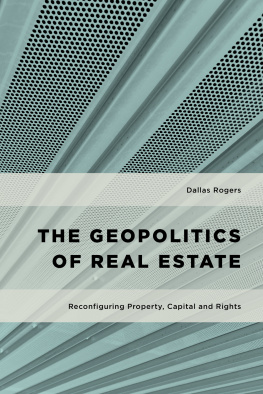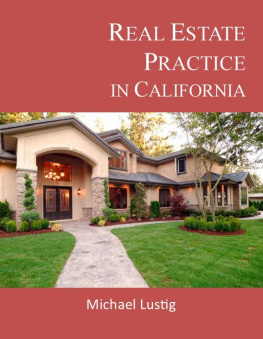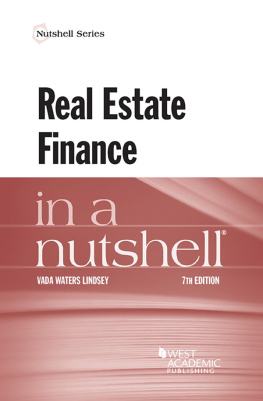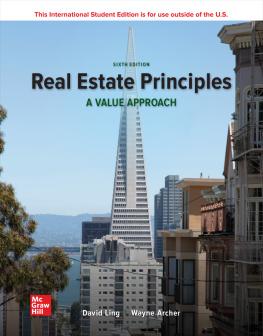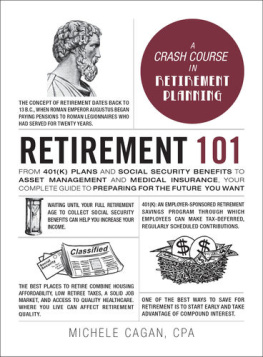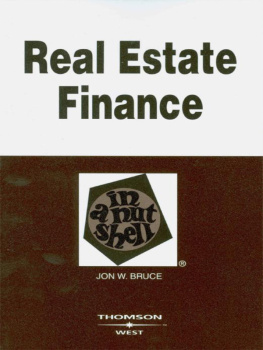The Geopolitics of Real Estate
Geopolitical Bodies, Material Worlds
This series publishes studies that originate in a range of different fields that are nonetheless linked through their common foundation: a belief that the macro-scale of geopolitics is composed of trans-local relations between bodies and materials that are only understandable through empirical examination of those relations. It is the interaction of these elements that produces the forces that shape global politics, often with outcomes that differ from the predictions of macro-scaled theories. This world poses questions: how do materialities such as the built environment and the body reproduce global power structures, how are they caught up in violent transformations and how do they become sites of resistance? How do assemblages of human and non-human elements both fortify and transform political space? What possibilities for political change are latent within the present?
Series Editors
Jason Dittmer , Professor of Political Geography at University College London
Ian Klinke , Associate Professor in Human Geography and Tutorial Fellow at St Johns College, Oxford
Titles in the Series
The Geopolitics of Real Estate: Reconfiguring Property, Capital and Rights , Dallas Rogers (Forthcoming)
Choreographies of Resistance: Mobilities, Bodies and Politics , Tarja Vyrynen, Eeva Puumala, Samu Pehkonen, Tiina Vaittinen, Anitta Kynsilehto
Moving Lives: Critical Reflections on Climate Change and Migration , Andrew Baldwin and Giovanni Bettin
Territory Beyond Terra , Kimberley Peters, Philip Steinberg, Elaine Stratford
The Politics of Bodies at Risk: The Human in the Body , Maria Boikova Struble
The Geopolitics of Real Estate
Reconfiguring Property, Capital, and Rights
Dallas Rogers
London New York
Published by Rowman & Littlefield International, Ltd.
Unit A, Whitacre Mews, 26-34 Stannary Street, London SE11 4AB
www.rowmaninternational.com
Rowman & Littlefield International, Ltd. is an affiliate of Rowman & Littlefield
4501 Forbes Boulevard, Suite 200, Lanham, Maryland 20706, USA
With additional offices in Boulder, New York, Toronto (Canada), and Plymouth (UK)
www.rowman.com
Copyright Dallas Rogers, 2017
All rights reserved . No part of this book may be reproduced in any form or by any electronic or mechanical means, including information storage and retrieval systems, without written permission from the publisher, except by a reviewer who may quote passages in a review.
British Library Cataloguing in Publication Data
A catalogue record for this book is available from the British Library
ISBN: HB 978-1-7834-8332-7
PB 978-1-7834-8333-4
Library of Congress Cataloging-in-Publication Data
ISBN 978-1-78348-332-7 (cloth : alk. paper)
ISBN 978-1-78348-333-4 (pbk. : alk. paper)
ISBN 978-1-78348-334-1 (electronic)

The paper used in this publication meets the minimum requirements of American National Standard for Information SciencesPermanence of Paper for Printed Library Materials, ANSI/NISO Z39.48-1992.
Printed in the United States of America
Acknowledgements
Out of respect for Aboriginal cultural protocol I acknowledge this book was written on Western Sydney University campuses that occupy the traditional lands of the Darug, Tharawal, Gandangarra and Wiradjuri peoples. This will always be their land. But as I show in this book, it continues to be subjected to Euro-centric legal codes and notions of property. The legal coding of property is often concealed within the mundane practices of everyday life, the almost invisible acts that many of us overlook, like placing a copyright symbol and a few legal words on the copyright page of this book. Few people read the copyright page, but it is nonetheless a powerful act that turns ideas into defensible property. In some small way, I hope to further expose the everyday practices of foreign settlers that allow them to claim Aboriginal land.
Thank you to Jason Dittmer for asking me to write a book for the Geopolitical Bodies, Material Worlds book series, after what I thought was a casual coffee at the 2014 American Association of Geographers Conference. I had originally proposed The Globalisation of Real Estate as a title of the book. Jason suggested The Geopolitics of Real Estate , and I quickly claimed it as my own. The ideas within this book have a slightly longer history, and they can be traced back to a brief moment at the Australasian Housing Researchers Conference in Adelaide in 2012. As Chris Paris approached the podium to talk about the second homes of the super-rich, he paused, and said in passing, All this talk about community housing and the poor! If you really want to address the housing issues that affect the poor, then dont look at what the poor are doing. Take a look at the rich and super-rich. At the time, I was in the final year of a 3-year Australian Housing and Urban Research Institute (AHURI)-funded study looking at the politics of Australian housing. The first year looked at local housing politics. The second year focused on state and territory housing politics. Then quite fortuitously in the final year, I was looking at national-level housing politics. I had been watching Chinese real estate investment increase in Australias residential real estate since 2011. I started investigating the politics of Chinese investment in earnest in 2012. Soon after, I set up the Global Real Estate Project to secure funding for an ongoing project. This book would not have been possible without the initial funding from the AHURI and the three rounds of funding from Western Sydney University between 2013 and 2015. The Global Real Estate Project took me from housing auctions in Sydney and Melbourne, where Australians that looked Chinese were being called foreign investors; to interviewing the Mousetribe in their basement air-raid bunker dorms in Beijing; to foreign real estate investment events in Hong Kong; and to the super-rich enclave of Sentosa Cove in Singapore. However, this book is not about the contemporary fieldwork that was conducted for the Global Real Estate Project . This book emerged out of being in the field and feeling that the typical history of foreign real estate investment is inadequate. Indeed, it was silent on many important issues. As an Australian, the most important silence for me was the question of whose land is being traded when we talk about foreign real estate investment? Foreign real estate investment history is surprisingly silent on the question of Indigenous land. I felt that I needed to historicise foreign real estate investment before I could begin to understand the empirical data collected for the Global Real Estate Project . This book is the product of those historical ruminations. But like any scholarly endeavour, I could not have completed this project alone. I would like to thank the AHURI and Western Sydney University (WSU) for funding the empirical studies. Special thanks to the people who worked on Global Real Estate Project studies: Chyi Lin Lee (Western Sydney University), Shanthi Robertson (Western Sydney University), Alexandra Wong (Western Sydney University), Gulia Del Maso (Western Sydney University), Jingjing Zhang (Western Sydney University), Jacqueline Nelson (University of Technology Sydney), and Ding Yan (National University of Singapore). Many of these great scholars helped with cross-cultural fieldwork in China, Singapore, and Australia, quantitative data analysis, or the anti-racism and migration analyses. I was lucky enough to test out many of the ideas in this book at the following workshops, conferences, and seminars in Australia, Asia, and the United States. In 2013, I was invited to the Changing Economies: Chinese Change and Australia workshop hosted by the Centre for United States and Asian Policy Studies (Flinders University) and the Institute of National Academy of Economic Strategy Chinese Academy of Social Sciences (China). In 2014, Tim Bunnell organised a visiting fellowship at the National University of Singapore, which provided invaluable access to research assistants and fieldwork sites in Asia. I presented at a Cities Clusters Seminar at the National University of Singapore. In 2015, Ray Forrest, Bart Wissink, and Sin Yee Koh invited me along to their Workshop on the Super-rich at the City University of Hong Kong. I also presented work from the Global Real Estate Project at the 2015 Australasian Housing Researchers Conference, the 2015 Institute of Australian Geographers Conference, and the 2015 Australian Cities; Urban Geographies Workshop. Megan Watkins, Chris Ho, and Rose Butler invited Shanthi Robertson and I to present at the 2015 Asian Migration and Education Cultures Workshop. Peter Phibbs asked me to organise a panel session for the 2015 Festival of Urbanism in Sydney on the Global Real Estate Project. And in 2016, I organised a session at the American Association of Geographers conference on the globalisation of Real Estate with David Ley and Sin Yee Koh. I also presented at the 2016 Institute of Australian Geographers Conference and the 2016 Housing Theory Symposium, and organised a workshop on Cities and the Super-rich with Ilan Vizel. Thank you to everyone who provided critical feedback at events.

 The paper used in this publication meets the minimum requirements of American National Standard for Information SciencesPermanence of Paper for Printed Library Materials, ANSI/NISO Z39.48-1992.
The paper used in this publication meets the minimum requirements of American National Standard for Information SciencesPermanence of Paper for Printed Library Materials, ANSI/NISO Z39.48-1992.
